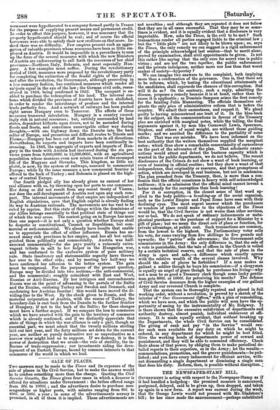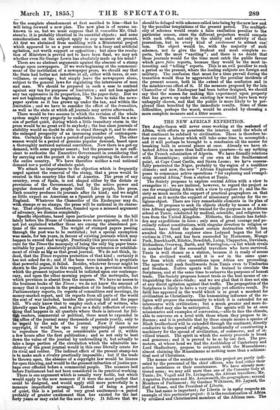THE NEWSPAPER-STAMP BTU,.
GOVERNMENT is acting with respect to the Newspaper-Stamp as if it had handled a hedgehog : the promised measure is announced, postponed, delayed, said to be given up, then dropped, and taken up again in a new form. A report was current daring the week, that Sir George Lewis would not proceed with Mr. Gladstone's bill; he has since made the announcement—perhaps substituted for the complete abandonment at first ascribed to him—that he will bring forward a new plan. The new plan is of course un- known to us, but we must suppose that it resembles Mr. Glad- stone's; it is probably identical in its essential objects ; and some considerations on the subject apply to any measure at present. At first we abstained from meddling with a Ministerial project which appeared to us a poor concession to a fussy and artificial agitation, not worth support or opposition ; but since the resolu- tion of Ministers is proved not to have been final, we may ask whether even Sir George Lewis has absolutely made up his mind ?
There are no abstract arguments against the absence of a stamp charge upon newspapers. If we were beginning at the commence- ment of the institution of a newspaper press, we should say that the State had better not interfere at all, either with taxes, or sur- veillance, or carriage ; but simply leave the newspapers alone, subject to the general laws for regulating the intercourse of man and man. We should be prepared in such a case to contend against any tax for purposes of limitation ; and not less against any tax oppressive in its proportion, like the paper-duty. But we are not beginning at the beginning. We have to take the news- paper system as it has grown up under the tax, and within the limitation ; and we have to consider the effect of the transition, as well as the state at which all journals may arrive afterwards. There would be two seasons in which the revision of the whole system might very properly be undertaken. One would be a sea- son of perfect quiet, during which a little transitory storm in the press would be no great evil to anybody ; the less since journals of stability would no doubt be able to stand through it, and to share the enlarged prosperity of an increasing number of contempora- ties. Certainly this is not a period of particular quiet. The other season would be a period of genuine popular demand, based upon a thoroughly matured national conviction. Now there is a got-up demand, with some popular assent ; but the pressure is not suffi- cient to authorize the Executive Government in considering that by carrying out the project it is simply registering the decree of the entire country. We have therefore neither a real national demand nor a period of absolute quiet.
We attach no importance to the objection which is frequently urged against the removal of the stamp, that a press would be created in this country like that of America. The press of any country, even of Spain, is not shaped either by the dictate or provisions of the Government, but by the active power and popular demand of the people itself. Like people, like press. Each country produces its journals after its kind; and we might as little expect an American as a Spanish press in the towns of England. Whatever the Chancellor of the Exchequer may do, with stamps or no stamps, the press will be national in its charac- ter. That objection, therefore, founded upon a misused argument of advocacy, we dismiss completely. Specific objections, based upon particular provisions in the bill lately before the House of Commons were more apposite, and it is not yet explained whether these are among the abandoned por- tions of the measure. The weight of stamped papers passing through the post was to be restricted; but a special exemption was made, for ten years, in favour of existing journals which may happen to exceed that weight. Practically this provision would se- cure for the Times the monopoly of being the only big paper trans- mittable by post; absolutely prohibiting the extension or establish- ment of rivals as big as that great journal. We do not think, in- deed, that the 2fmes requires protection of that kind ; certainly it has not asked for it ; and if the boon were intended to propitiate that powerful organ, it failed. Besides, whatever favour might be shown to the journal in this respect, there is a provision without which the grossest injustice would be inflicted upon our contempo- rary, and upon the other morning papers of the metropolis, but which provision is absent from the measure. We have no access to the business books of the Times; we do not know the amount of money that it expends in the production of its leading articles, its Parliamentary reports, its reports of committees and meetings, its money-market report, and its reports from all parts of the world the seat of war included, besides the printing bill and the paper bill. We only know that to employ such a staff of writers, who literally span the globe, and to give us a daily reflection of every- thing that happens in all quarters where there is interest for Bri- t411 readers, commercial or political, there must be expended in Wit office of the journal many thousands of pounds yearly, only to be repaid by the sale of the journal. Now if there is no copyright, it would be open to any unprincipled speculator to reproduce the Times' or considerable parts of it, within a few -hours after the first publication ; and so not only to beat down the value of the journal by underselling it, but actually to take a large portion of the circulation which the admirable ma- chinery of the great journal would in this case literally create for its rival and robber. The indirect effect of the present stamp-tax is to make such a rivalry practically impossible ; but if the trade be thrown open, the absence of a copyright law would be licence for open thieving, and would be the grossest infraction of justice per- haps ever effected before a commercial people. The measure laid before Parliament had not been considered in its practical working.
There is one argument which is usually very feeble, but which would apply to the new measure if it were the most perfect that could be designed, and would apply still more powerfully to a measure imperfectly arranged. Instead of being a period of quiet, this is a period of very great excitement—a period probably of greater excitement than has existed for the last forty years or may exist for the next forty. It follows that we
should be deluged with schemes called into being by the new law and by the peculiar temptations of the present period. The multipli- city of schemes would create a false exaltation peculiar to the particular season, since the different projectors would compete with each other, not only in the ability and activity of their journalism, but in every kind of excitement to attract cue; tom. The object would be, with the majority of such schemes, not to give the freshest and most complete re- ports, but the most "exciting"; and there is no doubt that those journals would for the time most catch the public favour which gave false reports, because they would be the most in- teresting and " telling " reports. This is an evil peculiar to such a period as the present, where the leading subjects are foreign and military. The confusion that must for a time prevail during the transition would thus be aggravated by the peculiar incidents of the present season, both in the extent of the confusion and in the mischievous effect of it If the measure proposed by the late Chancellor of the Exchequer had been better designed, we should say that the season for making this experiment upon property that has grown up under the existing law would have been very unhappily chosen, and that the public is more likely to be per- plexed than benefited by the immediate results. Some of these difficulties, perhaps the worst, would be avoided by choosing a more complete measure and a fitter season.



























 Previous page
Previous page